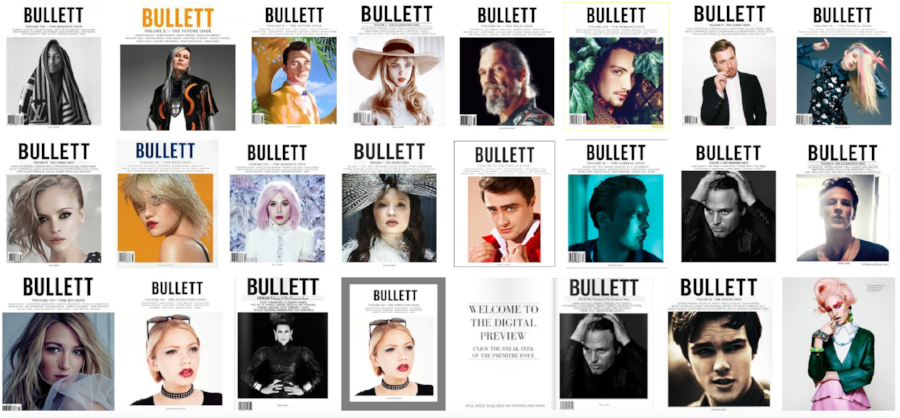 image: Bullett
image: Bullett
BULLETT announced on Monday that it will shutter its print magazine and everything that goes along with it. In a letter posted to the seven-year old media company’s site announcing the news, co-founder and the magazine’s final editor-in-chief, Idil Tabanca, writes, “What we do here at BULLETT is to watch, dissect and discuss the zeitgeist of modern culture.” Unsurprisingly, the mag’s farewell letter is both a perfect reflection on the modern-day zeitgeist and an ode to the need for indie publications just like this one.
Created in 2010 by mid-20-somethings Erin Ralph, Idil Tabanca, Sah D’Simone and James Orlando, BULLETT boasted a “kind of hipster-meets-outsider-meets-intellectual sense of style,” as the Coveteur so aptly put it a couple of years ago. The magazine and its site – with its “media-savvy, young and unabashedly precocious fashion fanatic vibe” – created “a niche following amongst young, on-the-fringe cool kids, kids much like the founders themselves,” per Fashionista’s Whitney Bauck.
In short: BULLETT got its start, and kept its cool, thanks to its insightful, anti-cookie cutter take on fashion and journalism, but now, in 2017, that simply is not enough. Nowadays, even some of the more thoughtful, old-school journalism, as distinct from catchy, clicky new age content-posing-as-journalism, is not exempt from what Tabanca calls “the measures that we are held accountable for by advertisers – ‘likes,’ ‘follows,’ ‘unique visitors’ – in order to meet their target quota set skewed standards for what’s expected of journalism.”
“Reputable organizations,” writes Tabanca, “that have dedicated years raising talent and capital are now outstaged by bloggers who can barely spell or turn the camera away from themselves.” And still yet, “We are swimming against the current (a.k.a. Facebook’s temperamental [as fuck] algorithm). A guy who spanks meat has more of a following than all niche magazines in New York City combined. This is what culture today boils down to: Memes.”
If this larger sentiment sounds a bit familiar, that is because it is a narrative that has been expressed with increasing frequency in recent years by no shortage of individuals associated with the media, including by Twitter co-founder, Ev Williams, when he announced early this year that his publishing platform, Medium, would take a bit of a hiatus, complete with significant job cuts, office closures, and restructuring.
In explaining the end of Medium 1.0, so to speak, Williams stated on a blog post, “It’s clear that the broken system is ad-driven media on the internet. It simply doesn’t serve people. In fact, it’s not designed to. The vast majority of articles, videos, and other ‘content’ we all consume on a daily basis is paid for — directly or indirectly — by corporations who are funding it in order to advance their goals. And it is measured, amplified, and rewarded based on its ability to do that. Period. As a result, we get … well, what we get. And it’s getting worse.”
He continued on: “People who write and share ideas should be rewarded on their ability to enlighten and inform, not simply their ability to attract a few seconds of attention. We believe there are millions of thinking people who want to deepen their understanding of the world and are dissatisfied with what they get from traditional news and their social feeds. We believe that a better system — one that serves people — is possible. In fact, it’s imperative.”
Medium relaunched in August with the start of “a new model for writers and creators to be rewarded, based on the value they’re creating for people.” The specifics of Mediums’s new format – which entails a Partner Program and a system of gauging payment based on engagement (via “claps”) – are not the most noteworthy takeaway here.
One of the points of reflection should be that journalism, as we know it, has been co-opted largely by – and is rewarded almost exclusively based on – clickbait titles, fast and buzzy but not always accurate information, and consistently (but not always obviously) paid-for content. These types of tactics run rampant in media in every industry; they can even be found behind paywalls and prevail on some of the most renowned sites in any given industry.
Those publications that operate outside of the “modern” parameters of click-click content are relatively few and far between, and now, with the demise of BULLETT, we have one less.
Another touchstone worth addressing is that the future of journalism is not all doom and gloom. An array of young and young(ish) players are entering into the equation – The Information and The Outline are just two – and providing valuable news and insight sans erroneous headlines and inaccurate reporting. Other indie publications, such as Dazed, Vestoj, StyleZeitgeist, System, the Gentlewoman, and 032c, in the fashion arena, are similarly doing great work.
In terms of legacy publications, digital strategist Nic Newman of the Reuters Institute for the Study of Journalism says there is hope: “We are seeing is a major refocusing away from pure reach and pure numbers towards more subtle issues: ‘How do we create value? How do we get people to come back to our site more often?'” This should be comforting, as should the realizations that have come from the “increasing pollution of our news environments.”
According to Newman, the influx of low quality journalism “is creating a situation where there is an opportunity for quality news brands. I think this is the ray of hope.”







